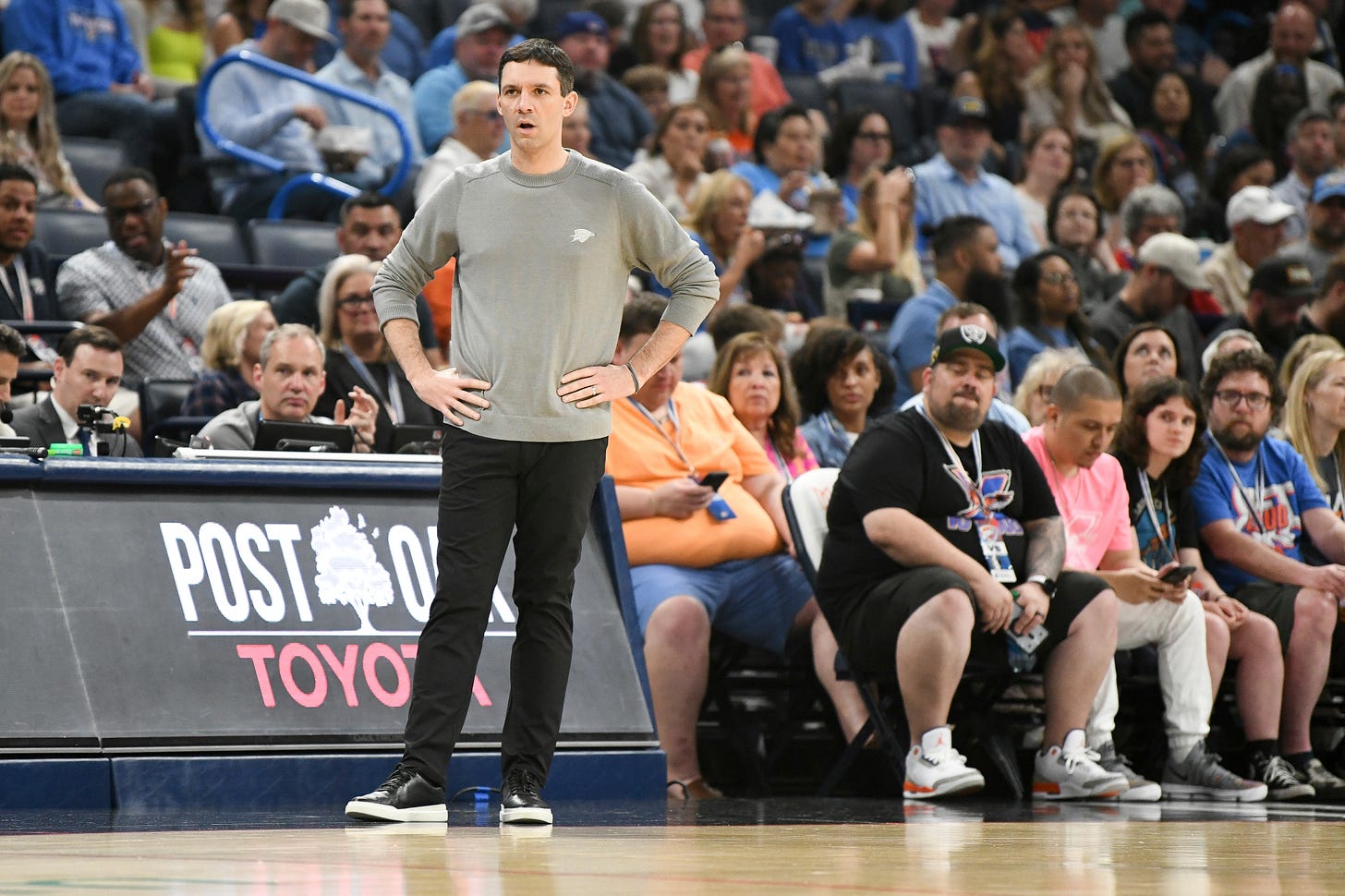Three good reasons Thunder can go deep
Already the No. 1 seed in the west, OKC can be even better in the playoffs

The best thing about the Oklahoma City Thunder is we have no idea just how good they can still be.
While most of the Western Conference fought amongst itself tooth and nail, hammer and tongs, the Thunder did, too, sort of, but cagily, as though coach Mark Daigneault, under the direction of general manager Sam Presti, skippered with one eye on the now, trying to win tonight, yet the other on the future, lest anyone forget this team’s never not building, lest Presti let anyone believe it’s all about this season.
Compare the Thunder to who they eclipsed in the West, Denver and Minnesota.
While OKC point guard Shai-Gilgeous Alexander — No. 3 on the MVP odds list behind Denver’s Nikola Jokic and Dallas’ Luka Doncic — has played 34 minutes per game, Jalen Williams 31.3 and no other Thunder teammate even 30, Denver’s entire starting five, led by Jokic’s 34.6, have played at least 31.5.
While OKC’s minutes staircase gradually descends 11 deep to Jaylin Williams’ 13 per outing, Minnesota’s drops off a cliff between its eighth and ninth players, Kyle Anderson netting 22.6 and Monte Morris 15.1.
The Thunder have room at both ends to play their best players more and though we can’t know what Daignealt’s playoff rotation will be, there’s space to play SGA and Williams, not to mention Chet Holmgren, significantly more.
Meanwhile, all of Gordon Hayard’s 17.2 minutes could be divvied between Cason Wallace, Isaiah Joe and Aaron Wiggins, finally giving the latter two the court time they’ve long deserved.
Not to mention the freedom Daigneault ought to have to stick with who’s hot, perhaps not pulling SGA to begin the second or fourth quarters, as he has through the regular season, when he’s rolling entering the breaks. Or pulling similar moves to benefit others, because who wants to, say, get in the way of Joe raining down more 3s?
A consistent rotation is fine in the regular season. The playoffs are situational.
It’s a whole new world and we should finally see what this team looks like when the pedal remains on the floor.
The next best thing about the Oklahoma City Thunder is its collective lack of ego, for its difficult to conceive of another NBA team that plays so together, celebrates as a unit rather than individuals, appearing so agenda free.
Nobody begrudges the five-year max deal Gilgeous Alexander signed in advance of the 2022-23 season, the one paying him almost $33.4 million this season that eventually tops out at $40.8 million in 2026-27. He’s the face of the franchise, OKC would be lost without him and he’s clearly one of the guys.
Hayward makes about the same, but he’ll soon be off the books and was never meant to be more than a role player when the Thunder picked him up at the trade deadline. So many of the rest, like SGA, are home grown, a majority on their first contract, so what’s to be upset about?
If you’ve been watching them all season, you know their postgame scene, huddled around sideline reporter Nick Gallo, who quickly interviews the game’s star after each win, only to be joined by three or four additional players, who eventually crack each other up, barking like dogs.
Yeah, sometimes I want to hear the star of the game talk, but those moments matter because these guys seriously like each other, like playing together, rooting for each other and haven’t been in the league long enough to be consumed by jealousy.
Indeed, in the era of player empowerment, which is not always conducive to team-building, the Thunder are interlopers, a blast from the pre-free-agency past, who see themselves as a unit, not so much a collection of individuals. And, one hopes, like the old Dodger infield of Garvey, Lopes, Cey, and Russell, they might last for a while.
The third best thing about the Oklahoma City Thunder is they’re playing with house money.
No pressure.
Just basketball.
The youngest team in the playoffs, OKC has no reason to believe it must first be humbled before excelling in the postseason. They’re too green for it to compute.
The Thunder won 16 more games last season than the one before, leaping from 24 to 40 and 17 more this one, catapulting to 57.
Though some of them were talking about the playoffs two exit interviews ago, nobody believed them then and those who believed they might do it this season, especially in their own market, only saw them as a play-in possibility.
They are, however, not to quote Bill Parcells, what their record says they are.
They’re 57-25, atop the never-been-tougher Western Conference, entering the playoffs with home-court advantage until the finals, should they get there.
They may well not.
But they might just.
They might separate themselves all over again and shock the world.
You’re crazy to think they can’t.


A thoughtful piece, both affirming what many of us have noticed and adding some great data on bench strength to the mix.
I literally laugh at one of the national sports guys. At the beginning of the season he insisted that the Thunder needed more help in the middle- a big physical center to play above 500%. The very same guy said at the beginning of the season that the Thunder needed the SAME THING to go anywhere in the playoffs. Do you think the Thunder has more going on in the middle than is obvious to guys like this?